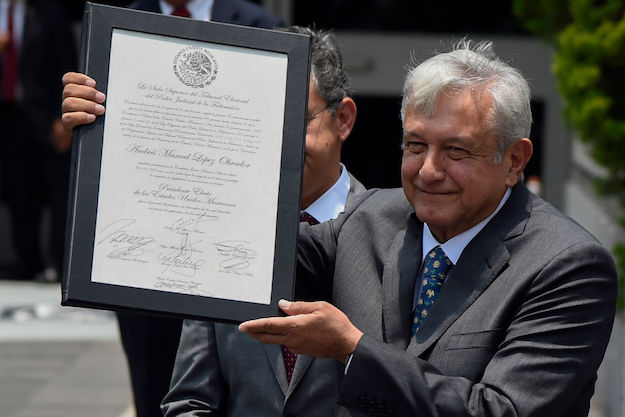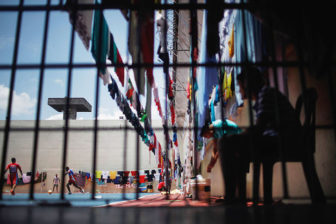Subscribe here to receive AMLO This Week by email
Mexico finally has its president elect, after the electoral court confirmed Andrés Manuel López Obrador’s July 1 election victory on Wednesday.
In accepting the court’s confirmation, López Obrador promised “not to meddle” with legislative or judicial decisions, and said that the presidency would “no longer be the power of powers.” But his big moment was somewhat overshadowed by news the same day that Elba Esther Gordillo, a maligned former teachers’ union boss who was arrested on corruption allegations in 2013, would be released from detention after the charges against her were dropped.
Gordillo was viewed as an obstacle to President Enrique Peña Nieto’s efforts to reform Mexico’s ailing education system, and his administration was widely criticized for its handling of her case. Time will tell whether she turns out to be a thorn in López Obrador’s side as well.
Peace Forums
López Obrador traveled (economy class) to Ciudad Juárez on Aug. 7 for the first in a series of peace and reconciliation forums to solicit public input on security policy. The president-elect got what asked for: His opening speech drew a vocal response from the crowd, which included victims, family members, and others directly affected by violence. His call to “forgive but not forget” was met with shouts of “no forgiveness without justice.”
Just days before the forum, around 100 state security officials were sent to Ciudad Juárez following a spate of homicides in the city that reportedly killed 26 people in the span of 24 hours. López Obrador says he will focus his security policy on dealing with the root causes of violence, and that there will be no taboos in discussing ways to reduce it. “If a foreign government doesn’t like it, we don’t care; if it’s good for Mexico, we’ll put it into practice,” he said, apparently in reference to measures – such as a new tack on the drug war – that could upset the status quo with the U.S.
To manage his security policy, López Obrador plans to reconstitute the Secretariat of Public Security (SSP), whose functions were assumed by the Interior Ministry at the beginning of the current administration. Following a meeting at the national palace yesterday, López Obrador said that Peña Nieto had agreed to ask Congress to reinstate the SSP at the beginning of the new legislative period in September, so that the department can be in place on inauguration day.
Economic Optimism
Official figures released Aug. 2 showed Mexican consumer confidence at its highest level since 2008. The post-election optimism was also reflected in a recent poll in newspaper Reforma, in which at least 50 percent of respondents said they expected improvements in quality of life, health, education and more under the next administration.
But the economy that López Obrador is about to inherit is facing headwinds. In July, the IMF lowered its GDP projection for 2019 to 2.7 percent, citing uncertainty over NAFTA. A recent report from Mexico’s Center for the Study of Public Finances showed the number of workers earning less than the minimum wage had risen by nearly 30 percent between 2015 and 2018. The prospect of higher interest rates in the U.S. and a debt load above 45 percent of GDP could also limit AMLO’s ambitious public spending plans.
In a meeting Aug. 6 with Mexican engineering associations that was also attended by Carlos Slim, López Obrador outlined plans for 25 priority infrastructure and social development projects that he hopes to see to fruition during his six years in office.
Education Reform
López Obrador’s nominee for education secretary, Esteban Moctezuma, said that public consultations on education policy would begin on Aug. 27 in the southern state of Chiapas, a focal point of teacher protests against education reform. López Obrador has been critical of the Peña Nieto administration’s education policy, and says he plans to undo a 2013 reform he believes unfairly punishes teachers on the basis of evaluations.
Moctezuma also named his picks for key department positions, including former Olympian Ana Gabriela Guevara as head of the national sports commission and Gilberto Guevara Niebla, a veteran of Mexico’s 1968 student protests, to oversee efforts to ensure equality in education.
—
Russell is AQ’s correspondent in Mexico City









